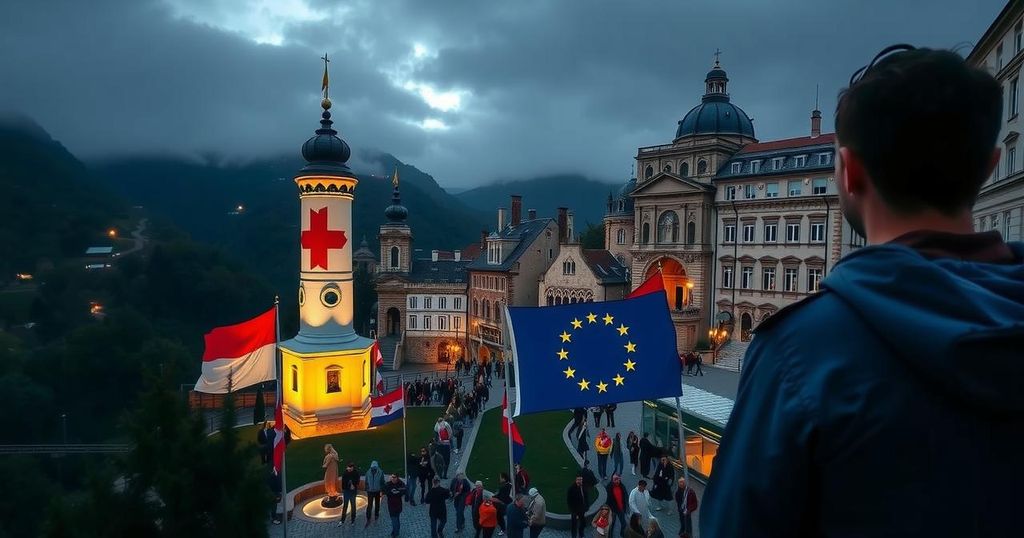Georgian Elections: A Defining Choice Between Russia and Europe

Georgia’s upcoming elections are described as a stark choice between aligning with Russia or striving for European integration. Opposition groups aim to end the governorship of the Georgian Dream party, which they accuse of veering towards Russia. While Georgian Dream promises EU membership, skepticism remains due to recent legislative actions perceived as undermining democratic principles. Voter sentiments reflect a diverse spectrum of opinions, highlighting Georgia’s complex relationship with its past and aspirations for a secure future in Europe.
In the lead-up to the pivotal elections in Georgia, the nation’s citizens find themselves confronted with a crucial decision regarding their country’s future alignment, particularly between continued ties with Russia and aspirations for integration into the European Union. This political contest is characterized by heightened tensions, rising from a historical backdrop of Russia’s military actions against Georgia, notably the brief war in 2008 that resulted in the occupation of regions such as South Ossetia. The four opposition groups have designated this election as a definitive choice between aligning with Russia or embracing Europe, aiming to end the decade-long dominance of the Georgian Dream party, which they accuse of re-establishing connections with Russia. Mindia Goderdzishvili, leading the campaign in Gori for the opposition Coalition for Change, highlighted the painful memories of past conflicts, stating, “In these streets we had Russians.” The ruling Georgian Dream party, under billionaire founder Bidzina Ivanishvili, refutes the opposition’s narrative, portraying themselves as a stabilizing force, claiming that opposition factions are backed by an obscure global entity intent on war. The struggle for Georgia’s future is further complicated by the severe geopolitical implications of its non-NATO status, which leaves the nation susceptible to external threats without significant security guarantees. Maka Bochorishvili, the head of Georgia’s EU integration committee, remarked on this precarious situation, emphasizing the lack of protection for Georgia since it is not a NATO member. Despite Georgian Dream’s pledge to secure EU membership by 2030, skepticism abounds, particularly in light of the EU’s recent withdrawal of support amid concerns over domestic laws perceived as stifling media freedom and undermining civic liberties, including provisions impacting LGBT rights. EU ambassador Pawel Herczynski expressed concern, stating, “instead of getting closer, Georgia is moving away from the European Union.” President Salome Zourabichvili has openly endorsed opposition parties, advocating for a technocratic governance approach should they prevail. Much media attention has been directed toward Bidzina Ivanishvili, especially his controversial statements regarding a potential ban on the United National Movement party, igniting fears of further political repression. At campaign events, Ivanishvili notably shifted blame for the 2008 war away from Russian aggressors to opposition leader Mikheil Saakashvili and his administration. The political landscape is riddled with uncertainties, as the recent introduction of an electronic voting system raises questions about the integrity of the upcoming elections. Opinions vary widely among voters; for instance, Aleksandre, a resident of Shindisi, questioned the claims that Saakashvili instigated the war and expressed a desire for the government to focus on domestic improvements rather than political power struggles. In this critical moment, as Georgians weigh their historical connections with Russia against their aspirations for a European future, the choice they make at the polls will determine their trajectory on the global stage.
Georgia’s elections are set against a backdrop of longstanding conflict with Russia, most notably highlighted by the 2008 war that saw significant territorial losses for Georgia. The political climate is currently dominated by the tension between the ruling Georgian Dream party, which has been accused of nurturing pro-Russian sentiments, and a coalition of opposition groups seeking a reaffirmation of a pro-European path. The historical grievances and the strategic importance of EU integration weigh heavily on the minds of voters, whose memories of warfare and occupation have fostered a profound desire for alignment with the West as a means of securing their nation’s sovereignty and prosperity.
In conclusion, the forthcoming elections represent a critical juncture for Georgia, where the electorate must decide whether to maintain ties with Russia or push for European integration. With the opposition framing the choice starkly as a decision between competing spheres of influence, the ruling Georgian Dream party’s efforts to recast itself as a peacemaker and protector of stability is indicative of the high stakes involved. As historical memories, international relations, and domestic politics converge, the outcome of this election will not only shape Georgia’s national identity but also its geopolitical future.
Original Source: www.bbc.com








